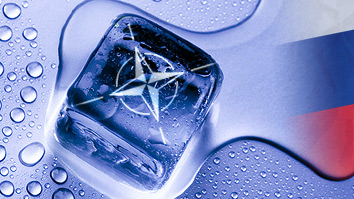
From Alexander Kramarenko, the Moscow Times: 1. Russia does have civilian and democratic control over its armed forces, which one could easily confirm by following debates in the country’s media. Some even believe that this control cannot be more civilian than is already the case. Moreover, in Russia’s history, including during the Soviet period, the country always had a longstanding tradition in that regard. Control by nongovernmental organizations may not be ideal, but here, too, steady progress has been made. …
To the best of my knowledge, there is ample openness in Russia’s military affairs. Take, for example, the latest military doctrine, published in February. …
2. As far as Russia’s military doctrine is concerned, it doesn’t say NATO per se is a danger, but rather the alliance’s eastward expansion closer to Russia’s borders, as well as its activity beyond the Euro-Atlantic space and when it acts outside of the existing framework of international law. In this context, it should be noted that Russia’s joint projects in Afghanistan have been flourishing over the past 2 1/2 years, ever since Russia signed the Afghanistan transit agreement in April 2008 in Bucharest at the Russia-NATO Council summit. …
3. As for China, Russia’s membership in NATO wouldn’t be a threat to China, since there would be a tripolar security cooperation structure among United States, the European Union and Russia. … [T]here will be nothing inherently anti-Chinese if Russia joins NATO, just as there is nothing inherently anti-Russian in France’s return to the alliance’s military organization, nor is there anything anti-Western in the Chinese-Russian union within the Shanghai Cooperation Organization, or SCO.
4. The Collective Security Treaty Organization, or CSTO, is not a mirror image of NATO. If Russia were to become a member of NATO, the alliance would be transformed into something new. This would be very much in line with current trends in international affairs, including former U.S. National Security Adviser Zbigniew Brzezinski’s concept of a global security web.
5. Russia’s global ambitions are reasonable. Russia is content to be one of the leading nations of the world, which is precisely where it is today. It is a leading member of the Group of 20, the G8, BRIC and SCO. Russia believes that the end of the Cold War effectively abolished the status of superpower.
I disagree with the author’s statement that Russia’s membership in NATO is “wishful thinking.” Of course, Russia will never knock at the alliance’s door, but if NATO invites Russia to join, it will be difficult to decline.
Alexander Kramarenko is director of the policy planning department at the Russian Foreign Ministry. (graphic: the Economist)
Image: Economist%209%2018%2009.jpg
